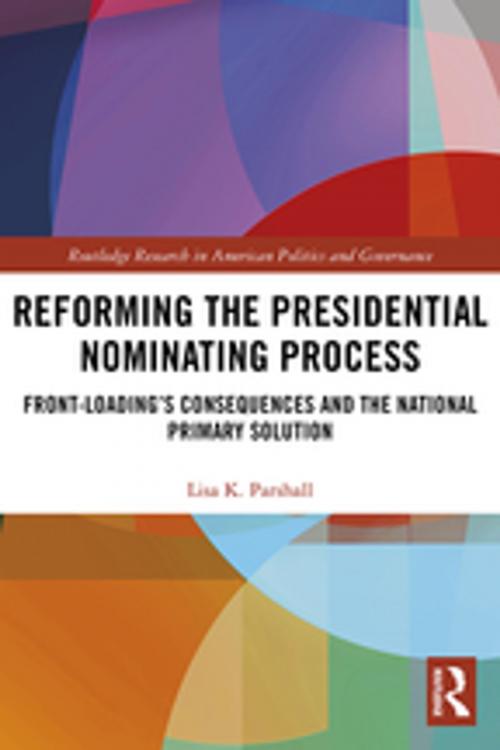Reforming the Presidential Nominating Process
Front-Loading's Consequences and the National Primary Solution
Nonfiction, Social & Cultural Studies, Political Science, Government, Elections| Author: | Lisa K. Parshall | ISBN: | 9781315308418 |
| Publisher: | Taylor and Francis | Publication: | June 14, 2018 |
| Imprint: | Routledge | Language: | English |
| Author: | Lisa K. Parshall |
| ISBN: | 9781315308418 |
| Publisher: | Taylor and Francis |
| Publication: | June 14, 2018 |
| Imprint: | Routledge |
| Language: | English |
The 2020 presidential selection process is already underway. As the political parties finalize their nominating rules and the states jostle for an advantageous contest date, potential challengers are being identified and sized up by party insiders. Once again, media and popular attention will be disproportionately focused on the candidates’ performance in the first and earliest of the state nominating contests—and on how quickly the sequence of primaries and caucuses winnows the field and identifies the presumptive nominees. But what are the implications of a sequential and front-loaded nominating calendar that gives some voters outsized influence while leaving many others with a constrained choice—or no choice—in the selection of their party’s presidential nominee?
Reforming the Presidential Nominating Process: Front-Loading's Consequences and the National Primary Solution critiques the contemporary nominating process from the perspective of voters and their right to effectively participate in their parties’ selection of a presidential nominee. Employing both a common-sense and legal, rights-based framework to invite a constitutionally grounded conversation on the legitimacy of the current presidential nominating process, Lisa K. Parshall argues that timing of participation in the nomination goes hand-in-hand with the right to choose a candidate and the fairest way to restore the promise of meaningful and timely participation for all voters is by adopting a same-day national primary.
Viewed from the party membership perspective, this work illuminates the fundamental interests at stake that should be considered in any potential reform of the presidential nominating system.
The 2020 presidential selection process is already underway. As the political parties finalize their nominating rules and the states jostle for an advantageous contest date, potential challengers are being identified and sized up by party insiders. Once again, media and popular attention will be disproportionately focused on the candidates’ performance in the first and earliest of the state nominating contests—and on how quickly the sequence of primaries and caucuses winnows the field and identifies the presumptive nominees. But what are the implications of a sequential and front-loaded nominating calendar that gives some voters outsized influence while leaving many others with a constrained choice—or no choice—in the selection of their party’s presidential nominee?
Reforming the Presidential Nominating Process: Front-Loading's Consequences and the National Primary Solution critiques the contemporary nominating process from the perspective of voters and their right to effectively participate in their parties’ selection of a presidential nominee. Employing both a common-sense and legal, rights-based framework to invite a constitutionally grounded conversation on the legitimacy of the current presidential nominating process, Lisa K. Parshall argues that timing of participation in the nomination goes hand-in-hand with the right to choose a candidate and the fairest way to restore the promise of meaningful and timely participation for all voters is by adopting a same-day national primary.
Viewed from the party membership perspective, this work illuminates the fundamental interests at stake that should be considered in any potential reform of the presidential nominating system.















